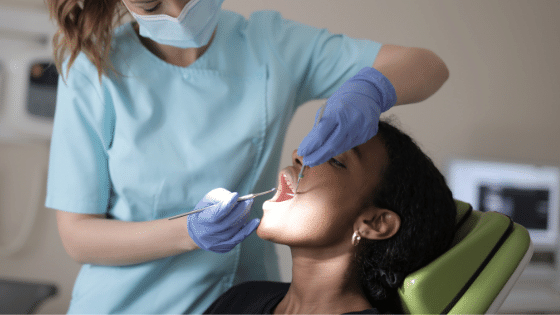TMJ Awareness Month: What You Need to Know 2021
We at 4th Street Family Dentistry, Dentist in St. Petersburg FL, are happy to answer some of the most common questions patients have about TMJ issues in honor of TMJ Awareness Month this November. According to the National Institute of Dental and Craniofacial Research, roughly 10 million Americans are affected by this disorder. The next sections go through the essentials of TMJ/TMD.
What is TMJ?
The TMJ, or temporomandibular joint, works like a hinge that connects your jawbone to the skull. You can find this ball and socket joint on each side of your head. The joint has an intervening disc, and collectively, they make it possible for you to chew, swallow, and speak.
What are TMJ disorders?
TMJ disorders are also referred to as temporomandibular disorders (TMD). Dr. Brian Leeson, the family dentist in St. Petersburg, FL, explains that TMJ disorders refer to a group of symptoms related to defects in the TMJ. These symptoms normally include pain in and around the temporomandibular joint. TMD affects the jaw muscles and other structures around the TMJ.
What are the Symptoms of TMJ disorders?
The best dentist in Shreveport, LA, Dr. Ben Kacos, points out that the symptoms of TMJ disorders vary widely, but the following are the most common;
- Pain in the jaw muscles or TMJ
- Joint sounds, such as popping or clicking
- Limitations in the range of movement of your jaw
- Tension in your neck or face
- Headaches, especially around your temples
- Pain or difficulty while you chew
What Causes TMJ Disorders?
If you search for a “St. Pete dentist near me” and talk to that professional, they will tell you that it is sometimes difficult to pinpoint the exact cause of temporomandibular disorders.
Some of the possible causes of TMD are listed below:
- Stress
- Jaw dislocation
- Arthritis
- Genetics
- Jaw or tooth alignment problems
- Teeth grinding or clenching
- Injuries affecting the side of your face or jaw joints.
What are the Available Treatment Options for TMD?
You need to see a family dentist in St. Petersburg, FL, for a proper diagnosis before appropriate treatment can be recommended. Since most TMJ disorders are self-limiting, Dr. Brian Leeson is likely to recommend a conservative treatment option, such as modifying your diet (eating softer foods, for example), avoiding repetitive functions (chewing gum or ice, for example), alleviating pain by using a heat pack, and practicing techniques aimed at making you relax your jaw muscles (meditation and biofeedback, for example). Also, Dr. Kim, Dentist Lexington KY, adds that your dentist can also prescribe medications. These include anti-anxiety drugs, muscle relaxants, analgesics, and anti-inflammatory drugs.
Sometimes, your emergency dentist in St. Petersburg, FL, may find it necessary to recommend a dental appliance such as a bite plate or night guard to limit how much you clench or grind your teeth. Surgery (arthroscopy and arthrocentesis, for example) are last-resort options when Dr. Brian Leeson determines that none of the conservative measures highlighted above will be of any help, or when they have been tried, and symptoms worsen or persist.
When Should One See a Dentist in St. Pete?
If you experience persistent jaw pain around the TMJ or have difficulties while opening or closing your jaw, see a dentist immediately. Contact 4th Street Family Dentistry, and Dr. Leeson will examine you and discuss the most appropriate treatment options to restore normalcy to the way your TMJ works.
Can 4th Street Family Dentistry Help with TMD?
Yes, Dr. Brian Leeson and our entire team have extensive experience treating different dental health conditions, including TMJ disorders. Don’t live another day with TMJ disorders; contact us today and schedule a consultation. We would be honored to help!
Editor’s note: This post was originally published in November 2020 and has been completely revamped and updated for accuracy and comprehensiveness.










